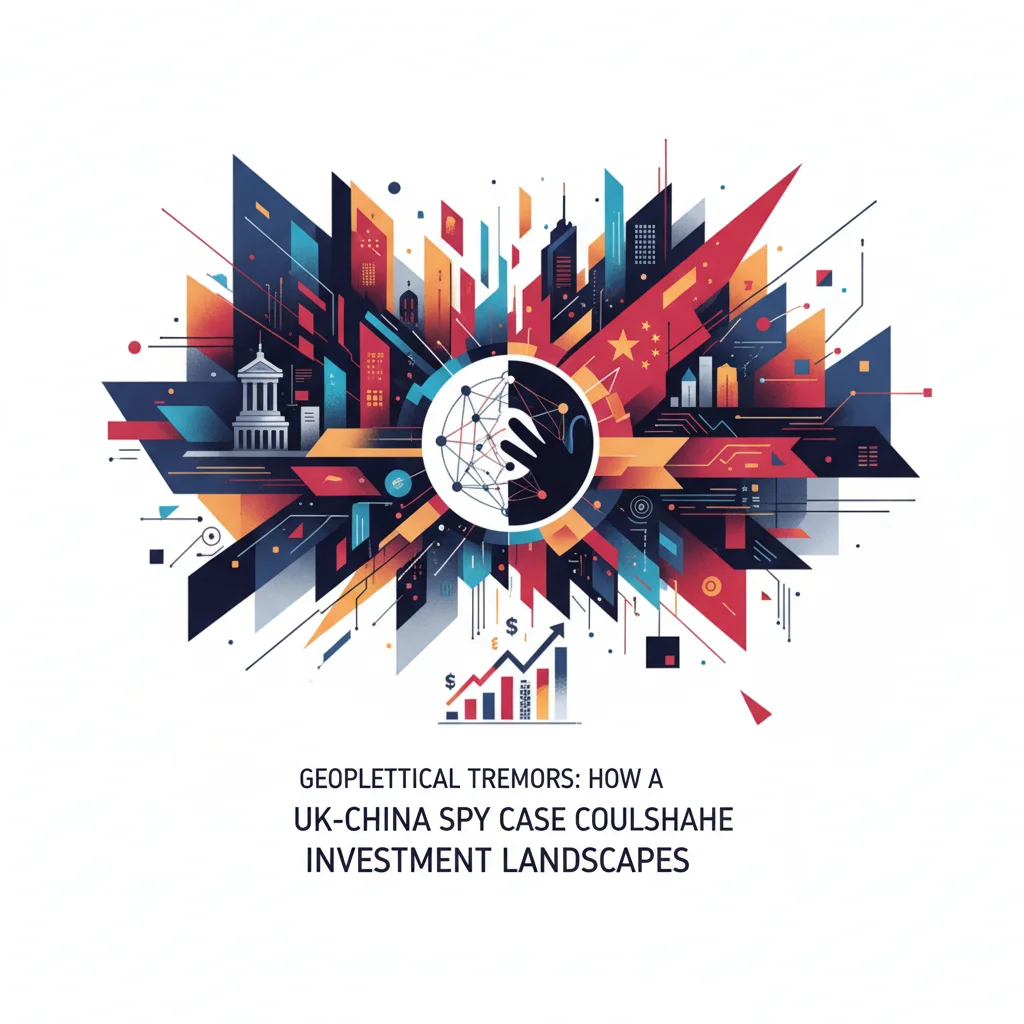
Geopolitical Tremors: How a UK-China Spy Case Could Reshape Investment Landscapes
The Intersection of Espionage and Economics
In the high-stakes world of international relations, headlines often focus on the cloak-and-dagger elements of espionage and political maneuvering. A recent case, involving a UK parliamentary researcher accused of spying for Beijing, is a prime example. While the story itself is compelling, for investors, business leaders, and financial professionals, the real narrative lies beneath the surface. The decision by the Crown Prosecution Service (CPS) to drop the case, and the alleged discussions involving a senior aide to Labour leader Keir Starmer about its potential diplomatic fallout, are not just political footnotes. They are significant indicators of the delicate and often precarious balance between national security and economic stability—a balance that directly impacts the economy, the stock market, and global investment strategies.
The core of the issue stems from allegations against a parliamentary researcher who was arrested under the Official Secrets Act. However, the prosecution was unexpectedly dropped. The Financial Times later reported that Jonathan Powell, a senior foreign policy adviser to Keir Starmer and former chief of staff to Tony Blair, had discussed the potential consequences of the case for UK-China relations with senior government officials. While Number 10 has firmly stated that Powell played no part in the CPS’s decision, the mere existence of such high-level conversations highlights the immense pressure governments face when dealing with strategically and economically vital nations like China.
Decoding the Economic Stakes in UK-China Relations
To understand why a single espionage case can send ripples through financial circles, one must appreciate the depth of the UK-China economic partnership. It’s a relationship characterized by immense opportunity and significant risk. China remains a critical market for British goods and services, a major source of foreign direct investment, and a key player in global supply chains. Any serious diplomatic rupture threatens to disrupt this intricate web of economic interdependencies.
This situation forces a difficult calibration of policy. On one hand, the UK government is committed to protecting its national security and democratic institutions from foreign interference. On the other, it cannot ignore the potential economic self-harm that could result from a major fallout with Beijing. This duality creates uncertainty, and uncertainty is the enemy of stable markets and confident investing.
To put the financial stakes into perspective, consider the key areas of economic linkage between the two nations and the potential risks associated with escalating diplomatic tensions.
| Economic Sector | Nature of UK-China Interdependence | Potential Impact of Strained Relations |
|---|---|---|
| Finance & Banking | Major UK banks like HSBC and Standard Chartered have significant operations in Hong Kong and mainland China. London is a key offshore hub for the renminbi. | Increased regulatory scrutiny on UK banks in China, potential restrictions on capital flows, and reduced M&A opportunities. |
| Higher Education | Chinese students represent the largest international cohort in UK universities, contributing billions to the economy annually. | A sharp drop in student numbers, leading to a funding crisis for many institutions and a negative impact on local economies. |
| Automotive & Manufacturing | China is a crucial market for luxury UK car brands (e.g., Jaguar Land Rover) and a key part of the supply chain for components, particularly for EVs. | Imposition of tariffs, consumer boycotts of British brands, and severe supply chain disruptions impacting UK production. |
| Technology & Fintech | Growing collaboration in financial technology, with UK firms seeking access to China’s vast market and Chinese tech giants (e.g., Tencent, Ant Group) investing in the UK. | Restrictions on technology transfers, increased cybersecurity hurdles, and a chilling effect on cross-border fintech ventures. |
From Political Risk to Market Volatility
For those involved in trading and asset management, events like these are textbook examples of geopolitical risk—a factor that has become increasingly critical in portfolio construction. The primary effect is a rise in the “risk premium” associated with UK assets or companies with heavy exposure to China. Here’s how the ripple effects can manifest across financial markets:
- Currency Fluctuations: Heightened tensions can lead to volatility in the GBP/CNH currency pair. Traders may sell the pound if they perceive the UK’s economic outlook to be threatened by a dispute with a major trading partner.
- Equity Market Impact: The share prices of FTSE 100 companies with significant revenue streams from China can become highly sensitive to diplomatic news. Investors may start to divest from these stocks, fearing retaliatory measures from Beijing, such as regulatory hurdles or state-encouraged consumer boycotts. According to some analyses, dozens of companies in the UK’s top index have notable exposure to the Chinese market (source).
- Foreign Direct Investment (FDI): Political uncertainty is a major deterrent for FDI. Chinese companies may pause or reconsider planned investments in UK infrastructure, technology, and real estate. Similarly, UK firms may delay expansion plans in China, dampening long-term growth prospects.
The controversy also touches upon the evolving world of financial technology and digital assets. As geopolitical fault lines deepen, nations are increasingly exploring ways to insulate their financial systems. China has been a pioneer in developing its Central Bank Digital Currency (CBDC), the digital yuan. Tensions with Western nations could accelerate the push for alternative payment and settlement systems that bypass traditional, dollar-dominated networks. This strategic shift has long-term implications for the global banking system and could create new opportunities and challenges in the blockchain and digital asset space.
The Road Ahead: Policy, Politics, and Portfolios
The involvement of a key aide to the likely next Prime Minister adds another layer of complexity. The investment community is now watching closely for clues about how a future Labour government might approach China. Would it adopt a more pragmatic, engagement-focused strategy, prioritizing economic ties? Or would it take a more hawkish stance, aligning more closely with the United States? Jonathan Powell’s alleged role in discussing the “diplomatic fallout” could be interpreted as a sign of the former, suggesting a preference for avoiding confrontation. This perspective is crucial for long-term strategic asset allocation.
This ambiguity in future policy is a source of risk in itself. Investors and corporations thrive on predictability. A lack of clarity on the UK’s long-term China strategy—whether it will be driven by security concerns or economics—makes it difficult to make multi-year investment decisions. Businesses planning supply chains, capital expenditures, and market entry strategies need a stable policy environment to operate effectively.
In conclusion, the dropped spy case is far more than a fleeting political scandal. It is a microcosm of the central geopolitical and economic challenge facing the UK and other Western nations: how to manage the multifaceted relationship with a powerful, assertive, and economically indispensable China. For the financial world, it serves as a stark reminder that geopolitical undercurrents can shift market tides with little warning. The art of successful investing in the 21st century is no longer just about analyzing balance sheets and economic data; it is about understanding the intricate dance of diplomacy, security, and finance on the global stage.


